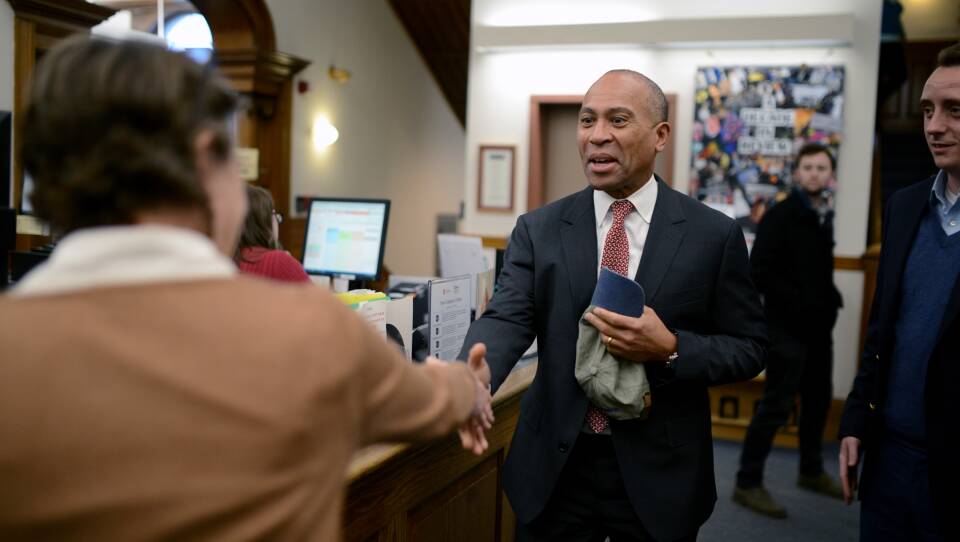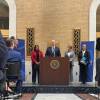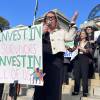On a wintry weeknight in downtown Manchester, New Hampshire, Deval Patrick introduced himself at the New England College Convention, an event for students interested in the New Hampshire primary. His stump speech was brief, featuring references to his hardscrabble childhood on Chicago’s South Side and his accomplishments as governor of Massachusetts.
But Patrick spent a considerable amount of time taking questions from the audience — and asking them himself.
“What would you do to protect 11 million undocumented immigrants?” a young woman who identified herself only as Jeanette asked.
Patrick said he'd start by enacting a comprehensive immigration-reform bill. Then he turned the tables. “What would you do?” he asked.
Seemingly flustered and flattered in equal measure, Jeanette giggled. She then identified herself as a DACA recipient and said she would pursue blanket amnesty for all people who immigrated to the U.S. illegally.
Patrick didn't endorse or reject her suggestion. But by giving her a platform, and listening attentively, he conveyed a clear message: Politics, as he sees it, is an ongoing dialogue between would-be leaders and the public they hope to serve.
Read more: Former Gov. Bill Weld’s Long-Shot Crusade For President
After the event concluded, another young woman, Julia Brown, said it was precisely that quality that impressed her most.
“I love him,” Brown said of Patrick. “He was more interested in having a conversation with people, rather than just trying to further his own policies.”
But, there was a catch. Brown attends Virginia Commonwealth University and can't vote in the New Hampshire primary. In fact, nearly everyone who spoke with WGBH News after Patrick’s appearance said that while they were impressed by his performance, they don't actually live in the Granite State.
That raised an obvious question: Why visit New Hampshire a few weeks before that state’s first-in-the-nation primary — and then begin your public schedule with an event that may not actually help you much in the state?
“The campaign is a national campaign,” Patrick replied. “It is about extending myself and the campaign and our message to everyone everywhere, because it’s about everyone everywhere.”
Tehcnically, of course, he's correct. But at the moment, calling Patrick's campaign "national" feels like a bit of a reach. In the latest Real Clear Politics average of national polls, Patrick gets less than one percent, putting him dead last among the 12 Democrats running for president.
Given that, it's tempting to conclude that Patrick — who stunned the Massachusetts political establishment by winning the Democratic nomination and the governorship in 2006, and fended off now-Gov. Charlie Baker in the general election four years later — is deluding himself about his presidential prospects. But that judgment may be too harsh.
A couple days after his Manchester appearance, Patrick spoke at the library in the town of Dover. The crowd was a bit smaller: maybe 80 people, compared to around 100 in Manchester. But as Patrick talked about changing the mechanisms of American democracy (like eliminating the Electoral College) and transforming our political mindset, the connection between candidate and audience was palpable. The attendees listened attentively, guffawed at Patrick’s quips and applauded vigorously when he wrapped up.
The Dover event was packed with actual New Hampshire voters. Among them: Tony Tagliaferro, a retired professor who said that no one in the Democratic field had really wowed him — until now.
“My initial feeling is that he’s got the complete package, not only [from] governing, but also, how he’s going to approach addressing a lot of these complex issues,” Tagliaferro said.
“There was a statement [Patrick made], and I said, 'Oh, I gotta remember that!'” he added. “‘Be bold in your thinking, but humble in your approach.’ And that’s what rang true throughout his presentation.”
After Dover, Patrick headed a few miles south for the final public event of his trip, a speech to Democrats in the town of Newmarket.
Once again, his pitch quickly yielded to a Q&A that featured a lengthy exchange with a military veteran who disagreed with Patrick’s proposal to ban assault weapons.
As their back-and-forth proceeded, Patrick seemed intent on finding some sort of common ground.
“Universal background checks, deeper,” he said. “Mental-health engagement and broader services — we’re on the same page there, right?”
“Absolutely,” the veteran replied.
“What else would you do?” Patrick asked.
Among the spectators in Newmarket was Terrie Norelli, a former speaker of the New Hampshire House of Representatives. After Patrick finished his presentation, I asked her about his claim — repeated throughout his visit to the Granite State — that voters there are just now beginning to make up their minds.
According to Norelli, that's only partially correct.
“There’s not a lot of time left,” she said. “Because if they’re like me, they’ve narrowed the field down to just a couple, and he’s going to have to break through that. So it’s not an easy task that he has ahead of him.”
The good news for Patrick? After seeing him in Newmarket, Norelli is considering adding him to her own personal shortlist of candidates.
“I might just have done that,” she said with a chuckle.
So, will Patrick shock the world on Feb. 11? Both the polls and the calendar suggest it's highly unlikely. Still, it's a testament to Patrick's considerable political skills that when you watch him in action, a strong showing doesn't seem nearly as far-fetched as you might think.





